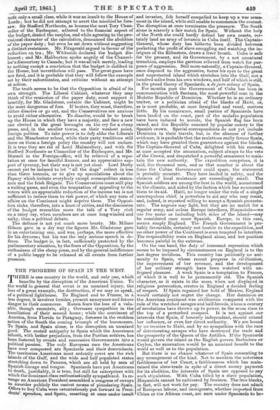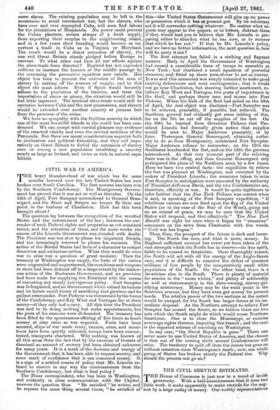THE PROGRESS OF SPAIN IN THE WEST.
THERE is one country in the world, and only one, which benefits by the disruption of the American Union. To the world in general that event is an unmixed injury, the loss of a great example, the destruction, if we may so speak, of•a political lighthouse. To England and to France, in a less degree, it involves besides, present annoyance and future danger to their commerce. Russia fears the loss of a valu- able, though eccentric, ally ; Germans sympathize in the humiliation of their second home ; while the continent of America, from Florida to Paraguay, foresees in the reckless action of the South the coming triumph of the buccaneers. To Spain, and Spain alone, is the disruption an unmixed good. The rooted antipathy to Spain which the Americans inherit, with better prejudices, from the Puritan settlers, has been fostered by events and successive Governments into a political passion. The only European race the Americans have ever conquered are Spaniards and their descendants. The territories Americans most ardently covet are the rich ialands of the Gulf, and the wide and half populated states stretching down to Panama, which are all held by men of Spanish lineage and tongue. Spaniards have put Americans to death, justifiably, it is true, but still for enterprizes with which the dominant class enthusiastically sympathized. In re- venge an American President assembled a congress of envoys to consider publicly the easiest means of plundering Spain. Offers to buy Cuba were ostentatiously put forward in Presi- dents' speeches, and Spain, smarting at once under insult and invasion, felt herself compelled to keep up a war arms. ment in the island, while still unable to commence the contest. The disruption at once terminates the pressure. The South alone is scarcely a fair match for Spain. Without the help of the North she could hardly defend her own coasts, cer- tainly land no army of invasion in Cuba itself. The Captain- General, whose duty has hitherto been divided between pocketing the profit of slave smuggling and watching the in- trigues of the filibusters, draws a freer breath. Cuba is safe for the present, and its Government, by a not unnatural transition, employs the garrison relieved from watch for pur- poses of aggression. Still more naturally, a Captain-General, once disposed to the aggressive, turns his eyes to the great and unprotected island which stretches into the Gulf, not a hundred miles from his own windows, and half of which is still, in the proud theory of Spaniards, a de jure colony of Spain. For months past the Government of Cuba has been in communication with Santana, the moat powerful man in the Mulatto Republic of Dominica. Whether he is an ordinary traitor, or a politician afraid of the blacks of Haiti, or, as is most probable, at once farsighted and venal, matters little. By his connivance, small parties of Spaniards have been landed on the coast, part of the mulatto population have been induced to accede, the Spanish flag has been raised, and the Republic annexed by popular outcry to the Spanish crown. Special correspondents do not yet include Dominica in their travels, but, in the absence of further evidence, it is probable that the mulattoes really favour Spain, which may have granted them guarantees against the blacks. The Captain-General of Cuba, delighted with his success, at once accepted the annexation, subject always to the veto of the Crown, and despatched a powerful armament to main- tain the new authority. The expedition comprises, it is said, five thousand men, and as that number is about the force the Cuban Government could spare, the statement is probably accurate. They have landed in safety, and the chances of local resistance are exceedingly small. The Spanish soldiers are among the best in the world, accustomed to the, climate, and aided by the faction which has summoned them to its aid. Haiti, no longer under the rule of a single unscrupulous chief, is powerless to aid any who may resist, and, indeed, is reported willing to accept a Spanish protecto- rate. The negroes may fight, but they are no match for a regular army, and unless Europe interferes, Hispaniola—we use the name as including both sides of the island—may be considered once more Spanish. Europe, in this case, means simply England. The French Government is pro- bably favourable, certainly not hostile to the expedition, and no other power of the Continent is even tempted to interfere. The responsibility rests on England alone, and her position becomes painful in the extreme.
On the one hand, the duty of incessant repression which seems to be imposed by circumstances on England is to the last degree invidious. This country has politically no ani- mosity to Spain, whose recent progress in civilization, the improvement of her revenue, and the development of her military strength have been watched with un- feigned pleasure. A weak Spain is a temptation to France, of which it is well to be permanently rid. The Spanish character, as it exists in the mass, when not displayed in religious persecution, creates in. England a decided feeling of respect. If Spain regained her hold of Mexico, England would certainly not regret the change. Her dominion on the American continent was civilization compared with the rule of the wretched savages and half-breeds, whom a century of revolutions have thrown up to power, as the scum rises to the top of a perturbed cesspool. It is not against our interests that Spain, if honestly independent, should extend her influence, or even her direct authority. We are bound by no treaties to Haiti, and by no sympathies with the race of deteriorating savages who have destroyed the trade and the prosperity of the Queen of the Antilles. If the Spaniards would govern the island as the English govern Barbadoes or Ceylon, the annexation would be an unmixed benefit to the world as well as to the population. But there is no chance whatever of Spain consenting to any arrangement of the kind. Not to mention the notorious faithlessness of her Court, a faithlessness which has main- tained the slave-trade in spite of a direct money payment for its abolition, the interests of Spain are opposed to any such stipulation. With Cuba tilled by a slave population, Hispaniola cannot be cultivated by freemen. The free blacks, in fact, will not work for pay. The country does not admit of European labour, and immigrants, whether imported from China or the African coast, are sure under Spaniards to be- come slaves. The existing population may be left in the mountains to avoid internecine war, but the slavers, who have over and over repeopled Cuba, will soon find labour for the plantations of Hispaniola. No power could prevent the Cuban planters, secure always of a fresh supply, from exporting their surplus to the neighbouring island, and in a few years slave breeding would become as im- portant a trade in Cuba as in Virginia or Maryland. The result would be a direct extension of slavery, the one evil Great Britain stands pledged before Europe to prevent. To what other end have all our efforts against the slave-trade been directed ? England has not expended millions to increase the horrors of the middle passage by the cramming the preventive squadron now entails. Her object has been to prevent the extension of the area of slavery by cutting off the sources of supply, and to this object she must adhere. Even if Spain would honestly adhere to the provisions of the treaties, and treat the importation of slaves as piracy, the situation would still be but little improved. The internal slave-trade would still be operative between Cuba and the new possessions, and slavery would be extended over another country at present free from the presence of the crime.
We have no sympathy with the fruitless anarchy to which one of the most beautiful islands in the world has been con- demned. We can accept with cordial pleasure any evidence of the renewed vitality and even the revived ambition of the Peninsula. But there are moral considerations superior both to civilization and political friendship, and they call impe- ratively on Great Britain to forbid the extension of slavery over or among a new population inhabiting a country nearly as large as Ireland, and twice as rich in natural capa- bilities.































 Previous page
Previous page